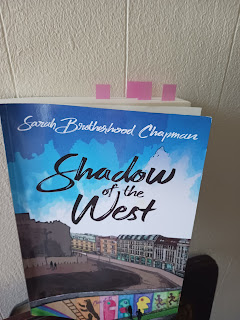Book reviews for the young and the old. This site reviews children, teen, and adult books with a few interesting things thrown into the mix. Check out the labels on the right hand side for specific genres or topics.
Monday, June 30, 2025
Goat Milk Soap Making by Daniel A. Hart
Thursday, January 2, 2025
Saving Vegetable Seeds by GD Kashuba
Monday, September 9, 2024
Write Like This by Kelly Gallagher
Genre: Educationa, Informational
Source: I purchased a copy
If you are a teacher or a homeschooling parent and don't know how to teach your children the important skills of writing based on real-world experiences, then this is the book you need.
Kelly is a wealth of knowledge in this area. His students are taught from the first day that writing is very important in his class. There are nine chapters in this book. One of my favorites was the chapter called Express and Reflect. I have been a reflective writer for years. I have had my students reflect on their work. I never considered teaching them the difference between expressive writing and reflective writing. Throughout the book he makes it clear that you need to demonstrate with the kids what you are trying to teach them. Show them that you too make mistakes in writing and that writing is hard, but reachable. The book is full of not only his examples, but also student examples. We as a teacher get to see his teaching method throughout the book. I have read this book at least three times. I learn something new every single time. I recommend all teachers take a look at this book.
Wednesday, July 12, 2023
Why It's Important to Read With Your Child
https://www.freepik.com/free-photo/parents-teaching-girl-read_8218054.htm#query=parent%20child%20reading&position=30&from_view=keyword&track=ais
Reading to or with your child is important at any age. Near the end of this school year I had a parent come to me and tell me she wanted to pick my brain about getting her daughter to read over the summer. I teach middle school and this young lady was getting ready to enter high school. Let me give you a little bit of background on this family. I had daughter one five or six years before I had daughter two in my class. They were polar opposites. Daughter one devoured books. In the classroom she would often lead discussions about books or texts we were reading. Daughter two was very compliant, but made it clear she just didn't really like to read. Her older sister tried to help her. She would recommend and pass on books she thought her younger sister would enjoy. I watched daughter two spend over a month with a book. I asked her if she enjoyed it and she told me no. I asked why she had forced herself to continue reading it and she told me because her sister said it was so good. Here are some things I had to teach this young lady and maybe they will help you.
First, make a list of things you like, or things you think you would like to read about. This young girl liked reading about real life things. That is why she thought she would like the book her sister had recommended. Then she said she liked books where there was some drama in it. Drama could be in the form of bullying, friends fighting, small beginning romances (teen issues not sex related).
The second thing she said to me was that she hated books that were too long. She was a slow reader and felt it would take her forever to read a book. That was another issue with the book her sister had given her. It had taken her a month and she lost interest. I took the information she had given me and pulled eight to ten books from my shelves. Some of them I told her I had not yet read. She picked the book Red Kayak by Priscilla Cummings. The next thing I did was asked her how long she wanted to take to read the book. I told her to give me the exact number of days. Then I pulled out my little sticky tabs (this is just one of the types I use). The book has 224 pages. She wanted to read the book in 14 days. This meant she would need to read at least 16 pages a day. I put a tab every 16 pages give or take. If a page didn't end with a period or was one or two pages from the end of the chapter then I moved the tab. I had created this system with my own daughter who was a reluctant reader. I do this when I have multiple books I am reading to review and have a deadline. It is an accountability piece for me, as you can see from my book below.
Not only did this young lady read the book in less than fourteen days, she talked to all of her classmates about it. To read it, I actually had to take the book home the day she returned it so I could give it to the next kid who wanted to read it. She had talked to me about the book as she was reading and kept telling me I had to read the book.
Teaching kids how to pick a book they might like, and when it is okay to abandon a book is just one part of making a reader out of a reluctant child. Showing them how to break a book into manageable chunks helps. The next step was easy. I told the parent, who wanted to keep the reading going over the summer to discuss with her daughter what book they could read together. Then I told her to schedule a time once or twice a week that they would discuss what they liked or didn't like about the book. I encouraged her to go to the library or the bookstore with her daughter so they could choose their next book.
So what prompted me to write this post? I read this post from "Everyday Reading" in this post she talks about how to move from picture books to chapter books with your children. I realized very few people think about or realize that for reluctant middle school and even high school kids, there are strategies to help them transition as well.
Monday, November 29, 2021
Once Upon a Time by Sheryl Green
Genre: Informational writing
Source: I received a copy to facilitate my review. The opinions
expressed here are my own.
Chapter 1 gets you right into the writing. The author of
this book gives ten writing prompts and then does something wonderful. She asks
two or three questions about the prompt to help move the writer forward. That
is one thing my students often struggle with. They choose a prompt but don’t
know how to move forward.
Chapter two deals with moving forward when you get writer’s
block. She offers a lot of hints and tips to help you with this problem. Then
you get ten more writing prompts.
Chapter three dealt with the elements of a story. You know
what I am talking about. You create a world, and then populate that world with
characters you have created. Then you
are given more tips and finally ten more writing prompts.
Chapter four is where the real work begins. You’ve written a
story and this chapter teaches you how to make it better through editing and
revision. This of course is followed by more tips and then ten more prompts.
This book is beneficial for children and adults alike. I can
see me using this in my classroom at school. I highly recommend this book
Saturday, November 25, 2017
Think Smart Not Hard: 52 Principles to Success and Happiness by Roy Huff
Monday, February 15, 2016
Fat Free For Life: 13 Principles for Guaranteed Weight Loss and Ultimate Health by Braxton Cosby DPT
Source: I purchased a copy
If you are looking for a book that will help you set and keep your weight loss goals, then look no further. This book focuses on the whole you. In his book Braxton starts off talking about a time he had to face a persistent painn. It hampered his ability to do things. He finally realized he was dealing with fear. The fear of the pain was so real in his mind that it prevented him from moving forward.. He learned to move past the fear and the pain. When I read that I really needed to hear it. I had stopped working out. I am facing double knee surgery in about three months. The procedures they had tried on my knees had stopped working. A few hours on my feet meant almost unbearable pain, so the idea of working out, doing my therapy, using my recumbent bike was out the window. When I realized that it was the fear of the pain that was keeping me from doing what I knew I needed to do, I took action. After working out on my bike I realized that the knees actually felt better.
Through this book the idea that I had to have a solid plan and be willing to execute that plan ws reinforced. I loved that Braxton reinforced my Christian beliefs that I must get my strength from god because this is definitely the hardest battle I've had to face. One of my favorite parts of this book is the "Cosby Corner" found throughout. He had one named "Why You Shouldn't Trust Yourself". He made a point that saying "I'll have just one" wo't work. I laughed because I knew how true this was. When i decided to make changes in the way I ate, I made a conscious decision to never eat another cream horn. This was before I decided to throw out ALL sugar. I told my husband of my decision and he said he would help me by justing letting me have one. I reminded hi the last tie he said and did that I ate all six of them in one hour. There are some foods that I had to make totally off limits because I can't trust myself to eat just one.
Another important chapter to me ws Chatper 9 "Buddy Up"
this chapter encourages you to find an accountability partner. this is so important. When I began my journey into eating a Paleo Diet my husband not only supported me but joined me. He decided we would all eat this way. My83 year-old mother lives with us and has lost 17 pounds just by eating what we eat. After I finished my 30 day challenge with Braxton Cosby, I joined a challenge at school with some of my fellow teachers. The motivation and lessons I learned from this book is what I will pass on to my friends and colleagues when I recommend this book to them.
So I have to ask you. Are you ready to set and keep your weight loss goals? Then purchase this book and get started.







